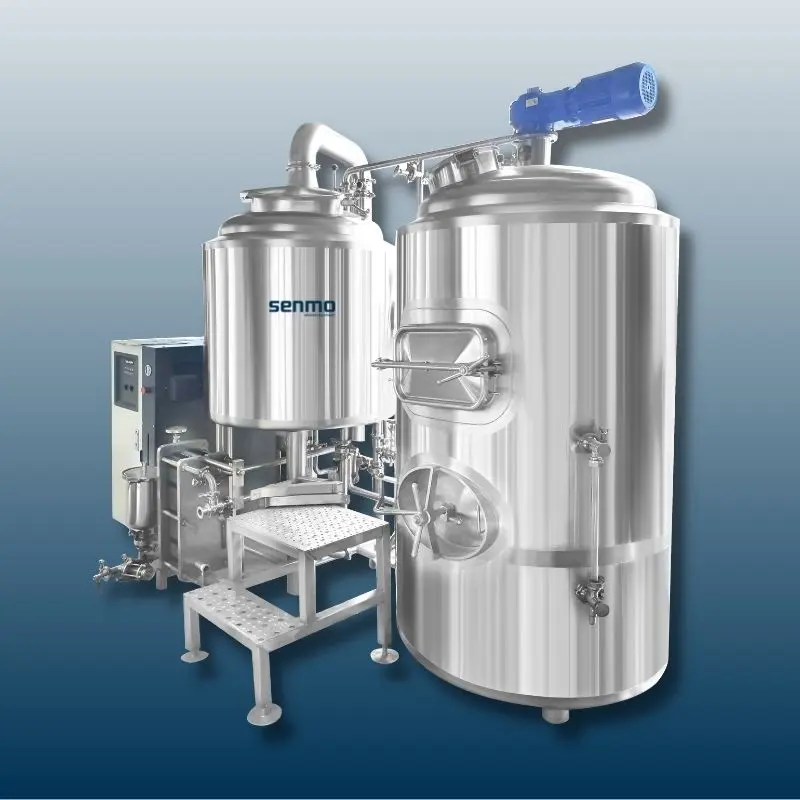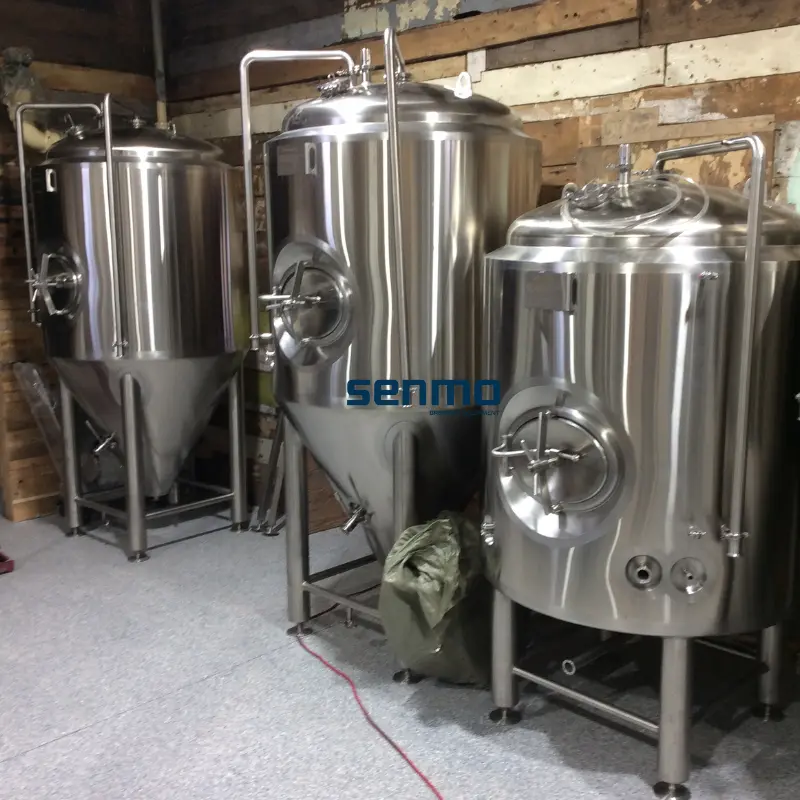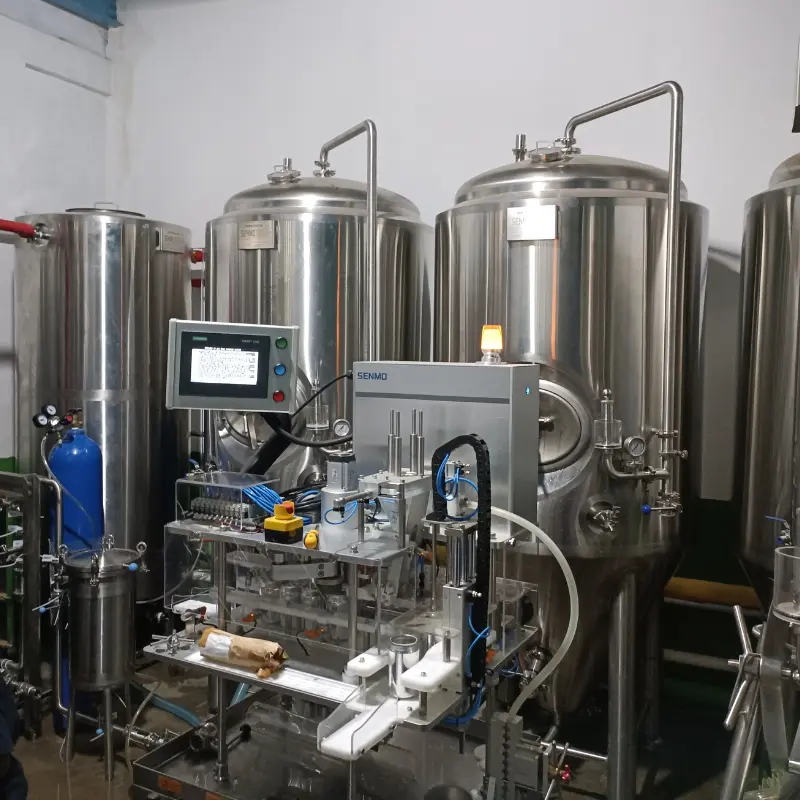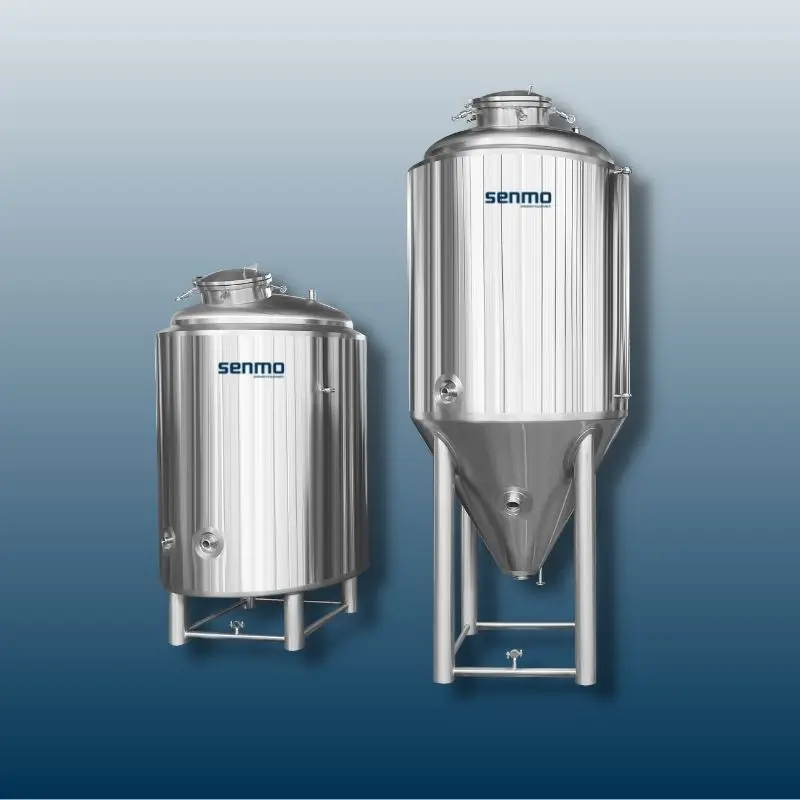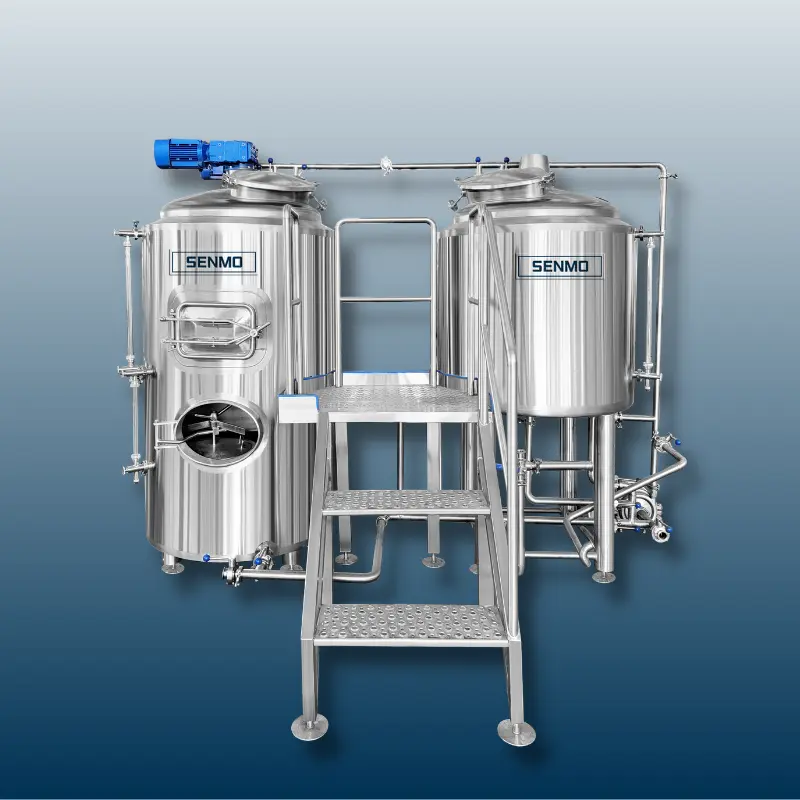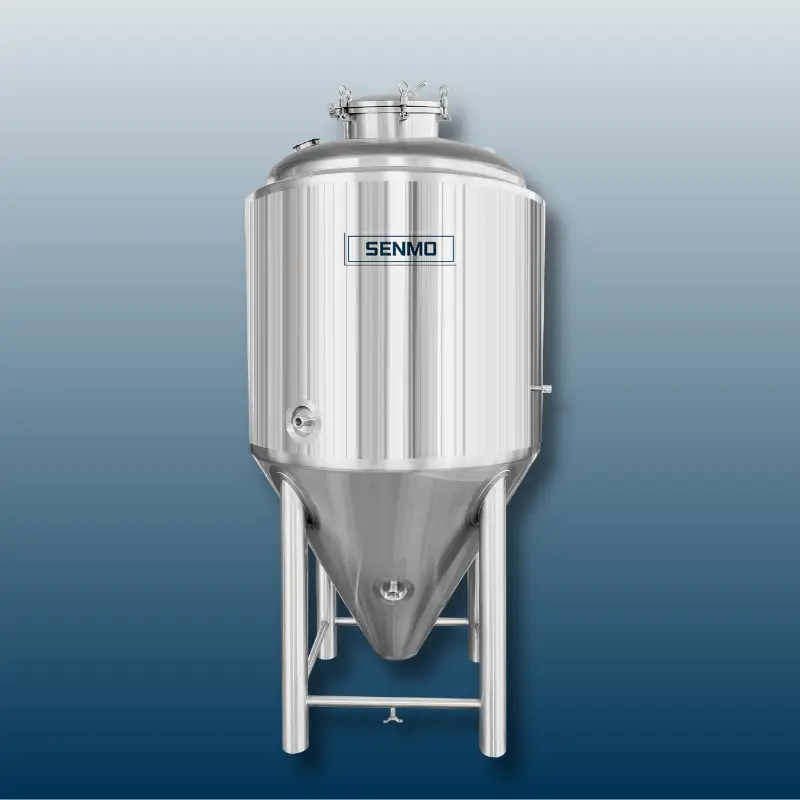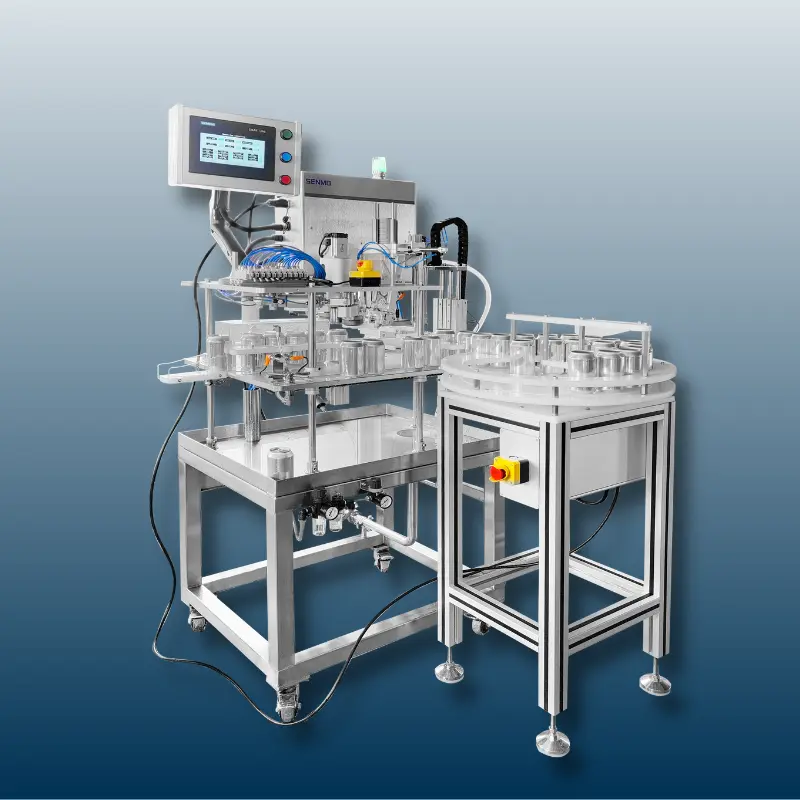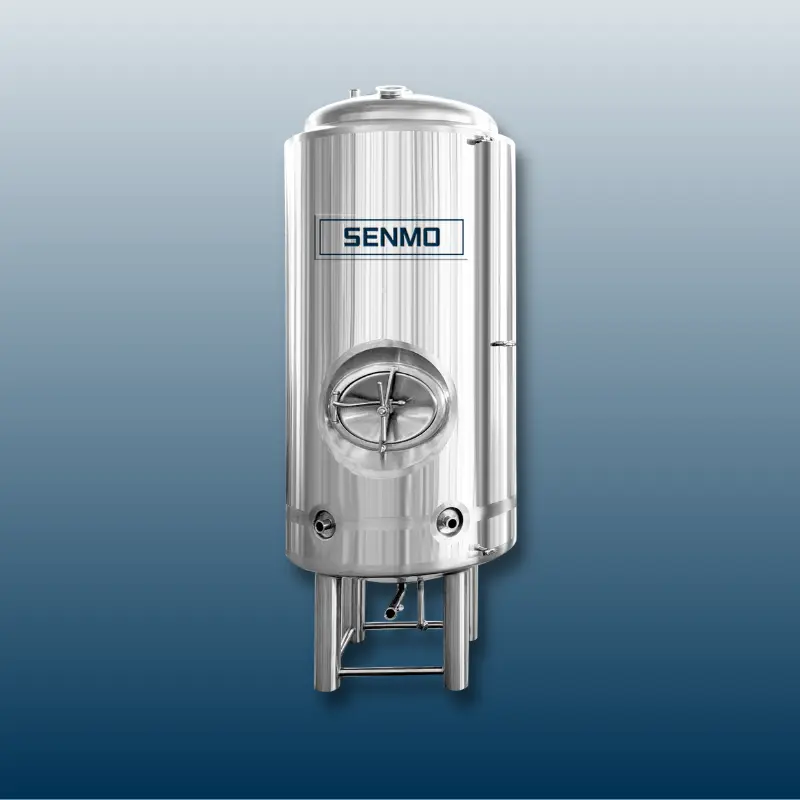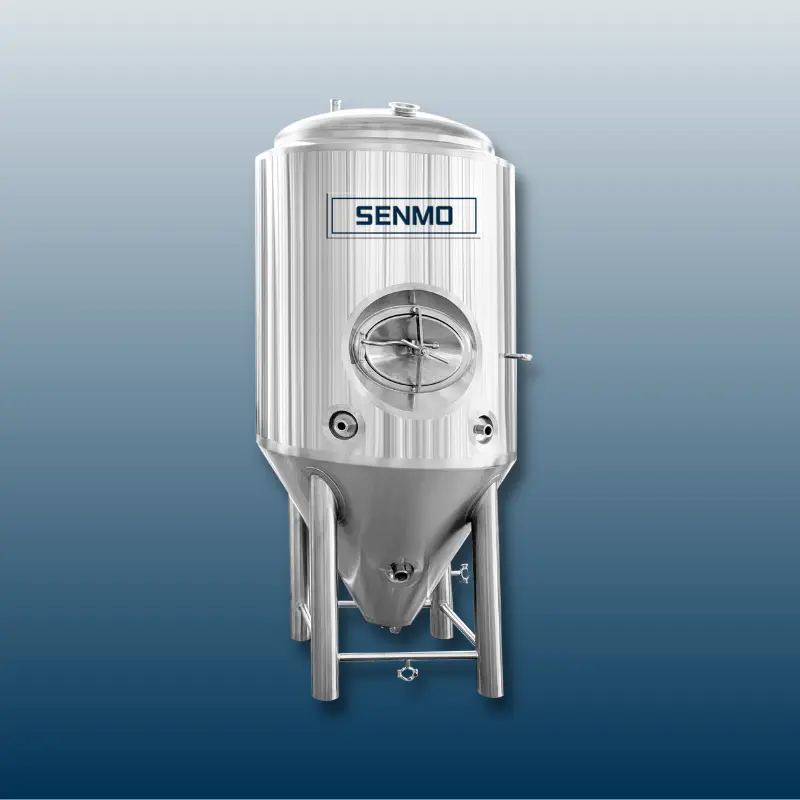Home brewing has become an increasingly popular hobby among beer enthusiasts who appreciate the art and science of crafting their own beverages. For those looking to elevate their brewing experience, stainless steel home brewery equipment stands out as a top choice. This article explores the benefits of using stainless steel equipment, the essential pieces for any home brewery, and tips for choosing the best products to suit your needs.
Why Choose Stainless Steel?
1. Durability and Longevity:
Stainless steel is known for its durability. Unlike plastic or glass, stainless steel equipment can withstand high temperatures, pressure, and the occasional bump or drop. This makes it a long-lasting investment for any home brewer.
Stainless steel can endure extreme temperatures without degrading. This is crucial during the brewing process, where temperatures can reach up to 212°F (100°C) during boiling. For instance, a typical home brewing process involves boiling the wort, a stage where the durability of stainless steel becomes evident. Unlike plastic, which can melt or release harmful chemicals at high temperatures, or glass, which can shatter, stainless steel remains stable and safe.
A brewing kettle made from stainless steel can consistently handle the high heat required for boiling without any risk of melting or emitting toxins, unlike a plastic kettle which can only withstand temperatures up to around 176°F (80°C).
During fermentation, pressure builds up as yeast converts sugars into alcohol and carbon dioxide. Stainless steel fermenters are designed to handle this pressure without compromising their integrity.
The Spike Flex+ Stainless Steel Conical Unitank, a popular choice among home brewers, can withstand up to 15 psi (pounds per square inch) of pressure, ensuring that it remains safe and intact throughout the fermentation process.
Stainless steel is significantly more resistant to physical impacts compared to glass, which can easily break, and plastic, which can crack or warp.
Stainless steel typically has a tensile strength of about 70,000 psi, whereas typical glass has a tensile strength of only around 7,000 psi. This means stainless steel is about ten times more resistant to breaking under tension compared to glass.
If a stainless steel fermenter and a glass carboy both fall from a height of 3 feet, the glass carboy is likely to shatter, while the stainless steel fermenter will most likely survive with minimal damage.
The combination of high-temperature resistance, pressure endurance, and impact durability means that stainless steel equipment often lasts significantly longer than alternatives made from plastic or glass.
A high-quality stainless steel brewing kettle can last over a decade with proper care, whereas plastic or glass equipment may need to be replaced every few years due to wear and tear or breakage.
A study comparing the longevity of brewing materials found that stainless steel equipment outlasts plastic and glass by an average of 5-7 years. Brewers who invested in stainless steel reported fewer replacements and repairs, leading to lower long-term costs.
According to a survey by the American Homebrewers Association, 85% of home brewers who switched to stainless steel reported a noticeable improvement in the lifespan and performance of their equipment compared to those using plastic or glass.
The durability and longevity of stainless steel make it an outstanding choice for home brewing equipment. Its ability to withstand high temperatures, pressure, and physical impacts ensures that it outperforms plastic and glass in almost every aspect. For home brewers looking to make a long-term investment in their hobby, stainless steel offers a reliable and robust solution, promising years of high-quality brewing experiences.
2. Easy to Clean and Maintain:
Stainless steel surfaces are non-porous, which means they do not harbor bacteria or absorb odors. This is crucial for maintaining the purity of your brew. The equipment can be easily sanitized, ensuring that each batch of beer remains uncontaminated.
The non-porous surface of stainless steel prevents bacteria from embedding and multiplying. This characteristic is essential in brewing, where any contamination can ruin a batch of beer. Unlike plastic, which can develop micro-cracks over time, allowing bacteria to grow, stainless steel remains smooth and impenetrable.
Studies have shown that stainless steel surfaces can reduce bacterial colonization by up to 99.9% compared to porous materials like plastic and wood. This reduction significantly decreases the risk of contamination in brewing processes.
Stainless steel does not absorb odors from previous batches, ensuring that each new brew maintains its intended flavor profile. This is in stark contrast to plastic, which can retain strong smells from previous uses, affecting the taste of new batches.
A brewer using a stainless steel fermenter for a robust stout can easily switch to brewing a delicate pilsner without any residual flavors affecting the new batch. In contrast, a plastic fermenter may carry over the strong aromas, impacting the pilsner's taste.
Stainless steel can be easily sanitized using common cleaning agents and high temperatures, ensuring that all brewing equipment remains free from contaminants. The smooth surface of stainless steel allows for thorough cleaning without leaving residues.
Research indicates that stainless steel surfaces can be effectively sanitized with a simple solution of water and bleach or by boiling water, achieving up to a 99.99% reduction in microbial presence.
A home brewer reported significant improvements in beer quality after switching from plastic to stainless steel equipment. Before the switch, the brewer experienced frequent off-flavors and inconsistent batches due to contamination. After transitioning to stainless steel, the brewer noted that the beers were consistently pure, with no unexpected flavors, attributing the improvement to the superior cleanliness of stainless steel.
Professional breweries widely use stainless steel for its sanitary benefits. Home brewers adopting stainless steel equipment align themselves with industry best practices, ensuring that their brewing processes meet high cleanliness standards.
Stainless steel's non-porous surface plays a crucial role in maintaining the purity and quality of home-brewed beer. Its resistance to bacteria and odors, coupled with ease of sanitization, ensures that each batch remains uncontaminated and true to its intended flavor. For home brewers aiming for consistency and high quality, stainless steel equipment is an indispensable asset.
3. Resistance to Corrosion:
One of the key advantages of stainless steel is its resistance to rust and corrosion. This is particularly important in brewing, where equipment is frequently exposed to moisture and various acidic ingredients.
Stainless steel contains chromium, which forms a passive layer of chromium oxide on the surface, preventing rust and corrosion. This protective layer ensures the integrity and longevity of the equipment, even when in contact with acidic substances like hops and malt.
Stainless steel typically contains at least 10.5% chromium. This chromium content is sufficient to form a self-repairing oxide layer that provides robust corrosion resistance. Studies have shown that stainless steel can resist corrosion in environments with pH levels as low as 3, which is comparable to the acidity of some beers.
In brewing, stainless steel's corrosion resistance is vital because the process involves frequent exposure to water, acidic wort, and cleaning agents. Equipment made from materials like aluminum or untreated steel would quickly degrade under these conditions, leading to rust contamination and potential health hazards.
A home brewer using a stainless steel fermenter reports no signs of rust after five years of regular use, including brewing highly acidic sour beers. In contrast, a non-stainless steel fermenter showed significant rust and corrosion within a year, affecting both the taste and safety of the beer.
The resistance to rust and corrosion translates to longer-lasting equipment, making stainless steel a cost-effective choice. While the initial investment might be higher compared to other materials, the reduced need for replacements and repairs results in long-term savings.
According to industry surveys, stainless steel brewing equipment typically lasts 20 years or more with proper maintenance, whereas non-stainless alternatives may need replacement every 3-5 years due to corrosion damage.
Stainless steel's resistance to rust and corrosion is a critical advantage in the brewing process. Its ability to withstand constant exposure to moisture and acidic ingredients without degrading ensures the longevity and safety of brewing equipment. For home brewers looking to invest in reliable and durable tools, stainless steel offers unparalleled benefits, making it the material of choice for serious brewing enthusiasts.
4. Consistent Quality:
Stainless steel provides a stable brewing environment. It does not react with the ingredients, ensuring that the taste and quality of your beer remain consistent batch after batch.
One of the primary benefits of stainless steel is its chemical inertness. This means that it does not react with acidic or alkaline ingredients used in brewing. Whether dealing with the acidity of hops or the alkalinity of certain water sources, stainless steel maintains its integrity without leaching any undesirable compounds into the beer.
Stainless steel alloys commonly used in brewing, such as 304 and 316, have high resistance to chemical reactions. Studies show that these alloys maintain their non-reactive properties even under extreme pH conditions (as low as 2 and as high as 12), which covers the entire range encountered in brewing.
The non-reactive nature of stainless steel ensures that the flavor profile of each batch remains consistent. Materials like aluminum and plastic can impart unwanted flavors or react with ingredients, altering the taste of the beer.
A brewer using stainless steel equipment consistently produces beers with stable flavor profiles, batch after batch. In contrast, brewers using aluminum equipment often report metallic off-flavors, especially when brewing highly acidic beers like IPAs and sours.
Stainless steel's stability helps preserve the quality of the beer by preventing contamination. It does not degrade or break down over time, which means there are no microparticles or substances that could contaminate the brew.
A homebrewer making a delicate pilsner can trust that their stainless steel brewing kettle will not alter the beer's light and crisp profile, preserving its intended taste from the first sip to the last.
Brewers who use stainless steel report higher satisfaction with their brewing results. A survey conducted by the American Homebrewers Association found that 92% of brewers who use stainless steel equipment are satisfied with the consistency of their beer's taste and quality.
The brewing industry predominantly uses stainless steel due to these stability benefits. Commercial breweries rely on stainless steel to ensure that large-scale production maintains consistent quality, batch after batch.
Stainless steel's stable and non-reactive properties make it the ideal material for brewing equipment. It ensures that the taste and quality of beer remain consistent, preserving the integrity of each batch. For home brewers who value consistency and high-quality results, stainless steel provides a reliable and inert environment that supports the art and science of brewing.
Essential Stainless Steel Equipment for Home Brewing
1. Brewing Kettle:
A high-quality brewing kettle is the cornerstone of any home brewery, playing a crucial role in the brewing process. When selecting a brewing kettle, it's important to consider key features that enhance its performance and durability. A brewing kettle with a thick bottom ensures even heating, which is essential for preventing scorching of the wort. This even distribution of heat contributes to a more efficient and consistent boil, improving the overall quality of the beer. Additionally, volume markings on the inside of the kettle allow for precise measurements of liquid, which is vital for following recipes accurately and maintaining consistency across batches. These markings help brewers add the exact amount of water and monitor evaporation rates during the boil. Investing in a high-quality brewing kettle with these features ensures a more controlled and reliable brewing process, leading to better-tasting beer and a more enjoyable brewing experience.
2. Fermenter:
Stainless steel fermenters are preferred in home brewing for their airtight seals and ability to maintain a consistent temperature throughout the fermentation process. These features are crucial for preventing contamination and ensuring that the yeast can work efficiently, resulting in a high-quality final product. The airtight seals prevent oxygen from entering the fermenter, which can lead to oxidation and spoilage, while the stainless steel construction helps maintain a stable temperature, which is essential for the proper development of flavors. Additionally, stainless steel fermenters are available in various sizes to accommodate different batch volumes, providing flexibility for home brewers to produce both small and large batches. This versatility, combined with the durability and ease of cleaning that stainless steel offers, makes these fermenters an ideal choice for both novice and experienced brewers looking to achieve consistent, high-quality results.
3. Mash Tun:
A mash tun is an essential piece of brewing equipment used to convert the starches in crushed grains into fermentable sugars through the mashing process. This conversion is critical for producing the sugars needed for fermentation, which yeast will later turn into alcohol and carbon dioxide. Stainless steel mash tuns are particularly advantageous due to their durability and excellent heat retention properties, which help maintain the optimal temperature needed for enzymatic activity during mashing. Additionally, stainless steel mash tuns often come equipped with false bottoms or screens, which are crucial for efficiently separating the solid grain material from the liquid wort. This separation is important to prevent the grain from being transferred into the boil kettle, ensuring a cleaner and clearer wort. The robust construction and efficient design features of stainless steel mash tuns make them a preferred choice for home brewers seeking to produce high-quality beer with consistency and precision.
4. Wort Chiller:
To quickly cool your wort after boiling, a stainless steel wort chiller is essential for any serious home brewer. Rapid cooling is critical because it reduces the risk of contamination by minimizing the time the wort spends at temperatures where bacteria and wild yeast can thrive. Stainless steel wort chillers are highly efficient and durable, making them ideal for this task. Immersion chillers, which are submerged directly into the hot wort, and counterflow chillers, which use a dual-tube system to cool the wort as it passes through, are popular options among brewers. Both types of chillers ensure rapid and effective cooling, bringing the wort down to yeast pitching temperatures quickly. This fast cooling not only helps prevent unwanted microbial growth but also aids in achieving a clear final product by encouraging the coagulation of proteins and other particulates. Investing in a stainless steel wort chiller enhances the overall brewing process, leading to better beer quality and improved safety in the brewing environment.
5. Bottling Bucket:
For the final step of the brewing process, using a stainless steel bottling bucket is essential for transferring beer into bottles easily and hygienically. The stainless steel construction ensures durability and prevents any contamination, maintaining the beer's purity and flavor. These bottling buckets are designed to make the bottling process as smooth as possible, with features that streamline the transfer of beer from the fermenter to the bottles. One key feature to look for in a stainless steel bottling bucket is a built-in spigot, which allows for controlled, smooth pouring, minimizing the risk of spills and oxidation. The spigot also facilitates a more efficient bottling process, reducing the time and effort required. Additionally, the sanitary nature of stainless steel helps ensure that no unwanted bacteria or contaminants are introduced during this critical stage. Overall, a stainless steel bottling bucket is a valuable investment for any home brewer aiming to produce high-quality beer with ease and precision.
Tips for Choosing the Best Stainless Steel Equipment
1. Assess Your Brewing Needs:
When setting up your home brewery, it’s crucial to consider the size of your batches and the complexity of the beers you want to brew. This will help you determine the capacity and features you need in your equipment to ensure efficient and high-quality brewing.
First, think about the volume of beer you plan to produce in each batch. If you're just starting out or brewing small batches for personal consumption, a 5-gallon setup might be sufficient. This size is manageable and allows you to experiment with different recipes without committing to large quantities. For instance, a home brewer who enjoys brewing a variety of beer styles might opt for a 5-gallon kettle and fermenter. This size allows for flexibility and the ability to produce multiple small batches, enabling the brewer to explore different flavors and techniques without excessive investment.
However, if you plan to brew larger quantities for sharing with friends or family, or if you have ambitions of entering the craft beer market, you might need equipment that can handle 10 or even 15 gallons. Larger setups require more substantial equipment, such as a bigger brewing kettle, larger fermenters, and additional storage space. For example, a brewer who frequently hosts beer tasting parties or participates in local festivals might find a 10-gallon system more appropriate. This setup ensures there is enough beer to meet demand without having to brew as frequently.
The complexity of the beers you intend to brew also plays a significant role in determining the necessary equipment features. Simple beer recipes, like basic ales, might only require standard equipment. However, if you want to brew more complex beers, such as lagers, sours, or barrel-aged stouts, you will need equipment with specific features.
For lagers, which require precise temperature control during fermentation, investing in a fermentation chamber or a temperature-controlled fermenter is essential. A home brewer aiming to craft a crisp, clean lager would benefit from a stainless steel fermenter equipped with a temperature control unit, ensuring the beer ferments at the ideal temperature range.
Brewing sours or other beers with extended aging periods might necessitate equipment that can accommodate secondary fermentation and storage. This could include additional fermenters, kegs, or barrels. A brewer interested in producing a complex sour beer might use a stainless steel fermenter with a spigot for easy transfer to a secondary fermenter or oak barrel for aging, allowing the beer to develop its unique characteristics over time.
Carefully considering your batch size and the complexity of the beers you want to brew will help you choose the right equipment for your home brewery. Whether you’re starting small with 5-gallon batches or aiming for larger, more complex brews, selecting equipment that matches your brewing goals will set you up for success and ensure a rewarding brewing experience.
2. Research Brands and Reviews:
Investing in reputable brands known for their quality and durability can save you money and frustration in the long run. One such brand to consider is SENMO Machinery, which has established a strong reputation for producing high-quality brewing equipment.
Why Choose SENMO Machinery?
1. Quality and Durability:
SENMO Machinery is known for its use of premium materials, such as high-grade stainless steel, which ensures the durability and longevity of its products. Their equipment is designed to withstand the rigors of brewing, from high temperatures to acidic environments, making them a reliable choice for home brewers.
2. Comprehensive Product Range:
SENMO offers a wide range of brewing equipment to suit different needs and batch sizes. Whether you are a beginner or an experienced brewer, SENMO has options that cater to various levels of brewing complexity. Their product line includes brewing kettles, fermenters, mash tuns, and wort chillers, all designed to enhance the brewing process.
3. Innovative Features:
SENMO Machinery incorporates innovative features in their equipment to improve brewing efficiency and convenience. For example, their brewing kettles often come with thick bottoms for even heating and built-in volume markings for precise measurements. Their fermenters are designed with airtight seals and temperature control options to ensure optimal fermentation conditions.
4. Positive Reviews:
Reading reviews from other home brewers can provide valuable insights into the performance and reliability of brewing equipment. SENMO Machinery consistently receives positive feedback for its product quality and customer service. Home brewers appreciate the brand's attention to detail, ease of use, and the overall improvement in their brewing results.
Many home brewers have praised SENMO Machinery for transforming their brewing experience. One user noted, "Switching to SENMO equipment was the best decision I made for my home brewery. The stainless steel fermenter maintains a consistent temperature, and the built-in spigot makes transferring beer so much easier. The quality is top-notch, and I haven't had any issues with contamination or off-flavors since upgrading."
Investing in reputable brands like SENMO Machinery ensures that you get high-quality and durable equipment that enhances your brewing experience. By choosing products known for their reliability and innovative features, you can avoid common frustrations and focus on crafting excellent beer. Reading reviews from other home brewers can further guide your purchasing decisions, helping you select equipment that meets your needs and expectations.
3. Prioritize Essential Pieces:
If you're on a budget, it's wise to start with the most crucial items, such as the brewing kettle and fermenter. These two pieces of equipment are essential for brewing beer, and having high-quality versions will set a strong foundation for your home brewery. As you gain more experience and confidence in your brewing skills, you can gradually expand your setup with additional equipment and accessories.
Brewing Kettle:
The brewing kettle is the heart of your brewing operation. It’s where you boil the wort, extract flavors, and sterilize the mixture. A high-quality brewing kettle with a thick bottom ensures even heating and prevents scorching, which is critical for producing a clean, flavorful beer. Look for kettles with built-in volume markings for precise measurements and a spigot for easy transfer of the wort.
A beginner home brewer might start with a 5-gallon stainless steel kettle. This size is manageable and allows for experimentation with different recipes. As the brewer becomes more skilled, they might upgrade to a 10-gallon kettle to accommodate larger batches and more complex brews.
Fermenter:
The fermenter is where the magic of fermentation happens, converting the sugars in the wort into alcohol and carbon dioxide. A stainless steel fermenter is a great choice because it offers airtight seals, maintains consistent temperatures, and is easy to sanitize. These features help prevent contamination and ensure the quality of the beer.
Starting with a 5-gallon stainless steel fermenter allows a new brewer to produce small batches while learning the intricacies of fermentation. As their brewing skills improve, they might add a secondary fermenter or upgrade to a larger capacity to handle bigger batches or more complex beer styles.
Gradual Expansion:
As you become more experienced and confident in your brewing abilities, you can expand your setup with additional equipment. Some useful additions include a wort chiller, which quickly cools the wort to yeast-pitching temperature, and a bottling bucket, which makes the bottling process more efficient and sanitary.
A home brewer who started with just the essentials might add an immersion wort chiller to their setup after a few successful batches. This addition speeds up the cooling process, reducing the risk of contamination and improving the clarity of the beer. Later, they might invest in a bottling bucket with a built-in spigot to streamline the bottling process.
Starting your home brewery on a budget is feasible by focusing on the most crucial items like the brewing kettle and fermenter. These essential pieces of equipment provide a solid foundation for your brewing activities. As you gain more experience and confidence, you can gradually expand your setup with additional tools and accessories, enhancing your brewing process and allowing you to produce a wider variety of high-quality beers. This approach not only helps manage costs but also ensures that you invest in equipment that truly meets your brewing needs and goals.
4. Check for Features:
When setting up your home brewery, it's beneficial to look for equipment with convenient features such as volume markings, built-in thermometers, and spigots, as these can significantly simplify the brewing process and improve your efficiency. Volume markings on brewing kettles and fermenters allow for precise measurement of liquids, ensuring you add the correct amount of water and ingredients, which is crucial for maintaining consistency across batches. Built-in thermometers provide real-time temperature readings, which are essential for various stages of brewing, such as mashing and boiling, where precise temperature control is necessary to achieve the desired enzymatic activity and hop utilization. Having an accurate thermometer integrated into your equipment helps you avoid the guesswork and potential errors associated with using external devices. Spigots, on the other hand, facilitate easy transfer of liquids, minimizing the risk of spills and oxidation that can occur when manually pouring wort or beer. This feature is particularly useful during the transfer of hot wort to a fermenter or when bottling the finished beer, as it allows for a more controlled and sanitary process. The inclusion of these features in your brewing equipment not only streamlines the brewing process but also enhances the overall brewing experience by reducing the likelihood of mistakes and improving safety. By investing in equipment with these practical features, you can focus more on the creative aspects of brewing and less on the technical challenges, ultimately leading to better-quality beer and a more enjoyable brewing journey. Whether you are a beginner or an experienced home brewer, choosing equipment with these enhancements can make a significant difference in your brewing efficiency and the quality of your final product.
5. Consider Future Expansion:
When selecting equipment for your home brewery, it’s wise to choose items that can grow with your brewing ambitions. Investing in modular systems or larger capacity items ensures that your setup can accommodate more complex brewing projects as your expertise increases. Modular systems, which allow you to add components as needed, offer flexibility and scalability. This means you can start with a basic setup and gradually expand by adding features like additional fermenters, advanced filtration systems, or specialized brewing kettles. This adaptability is particularly advantageous for home brewers who plan to experiment with different beer styles or increase their production volume over time.
Larger capacity items, such as bigger brewing kettles and fermenters, are also beneficial for accommodating growth. Starting with a 10-gallon kettle, for instance, allows you to brew both small and large batches, giving you the flexibility to adjust your production according to your needs. As you gain experience and confidence, having equipment that can handle larger volumes saves you from needing frequent upgrades and ensures that you can take on more ambitious brewing projects without being limited by your equipment.
Furthermore, equipment designed for scalability often comes with advanced features that enhance your brewing efficiency and precision. These features can include digital temperature controls, automated pumps for transferring liquids, and programmable timers for precise brewing steps. Such enhancements not only make the brewing process smoother and more enjoyable but also enable you to replicate recipes with greater accuracy, leading to more consistent and high-quality results.
Choosing equipment that can grow with your brewing ambitions also means considering the future potential of your home brewery. If you envision expanding your hobby into a small commercial venture, starting with professional-grade equipment can set a solid foundation for future growth. In essence, investing in scalable and higher-capacity brewing equipment ensures that your home brewery evolves with your skills and aspirations, allowing you to take on new challenges and produce exceptional beers as your passion for brewing deepens.
Conclusion
Stainless steel home brewery equipment offers unmatched durability, cleanliness, and performance, making it an excellent investment for any home brewer. By selecting high-quality stainless steel pieces, you ensure that your brewing process remains efficient and that your beer maintains its delicious flavor. Whether you're a novice or an experienced brewer, stainless steel equipment truly is a brewer's best friend.
